10 Life-Changing Books That Will Transform Your Perspective
INSTRODUCTION
In the ever-evolving journey of personal growth and self-discovery, books serve as powerful allies, guiding us through new perspectives and transformative experiences. Whether it’s fiction that ignites empathy or non-fiction that imparts wisdom, the right book can leave an indelible mark on our lives. Here, we’ve compiled a list of 10 life-changing books that have the potential to reshape the way you view the world and yourself.
1. “The Alchemist” by Paulo Coelho:

This enchanting tale follows the journey of Santiago, a shepherd boy, as he embarks on a quest to find his Personal Legend. Filled with profound wisdom, the book explores themes of destiny, dreams, and the courage to pursue one’s passions.
“The Alchemist” is a novel written by Brazilian author Paulo Coelho. It was originally published in Portuguese in 1988 and has since been translated into numerous languages, becoming a worldwide bestseller. The book is a work of fiction that blends elements of adventure, self-discovery, and philosophy.
The story follows a shepherd named Santiago who embarks on a journey in search of a treasure hidden in the Egyptian pyramids. Along the way, he encounters various characters who offer him wisdom and life lessons. One of the most important themes of the book is the idea of following one’s dreams and listening to one’s heart, even in the face of challenges and doubts.
Throughout his journey, Santiago learns about the concept of the “Personal Legend,” which is essentially a person’s unique purpose or destiny in life. The novel also explores the interconnectedness of the universe and the idea that everything is connected and part of a larger cosmic plan.
“The Alchemist” is known for its simple yet profound prose and its inspirational messages. It encourages readers to pursue their dreams and to overcome fear and obstacles in order to achieve their goals. The book has been praised for its universal themes and has resonated with readers from various cultures and backgrounds.
Overall, “The Alchemist” is a story of self-discovery, spiritual growth, and the pursuit of one’s true purpose in life. It has gained a large following and has been celebrated for its timeless wisdom and storytelling.
2. “Man’s Search for Meaning” by Viktor E. Frankl:
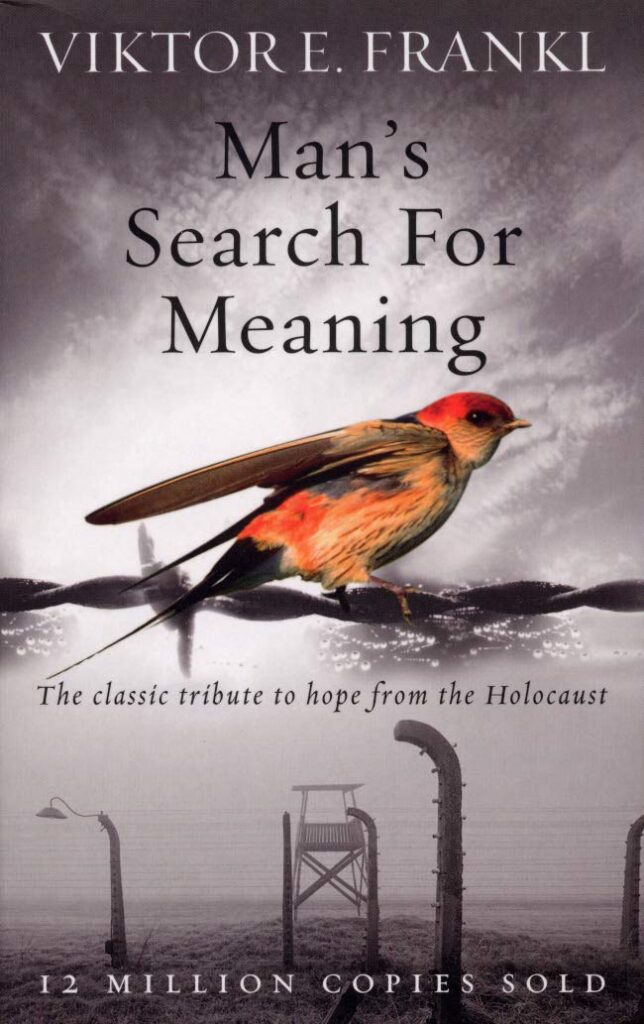
Drawing from his experiences as a Holocaust survivor, Frankl delves into the pursuit of purpose and meaning in the face of suffering. This insightful work is a testament to the human capacity for resilience and the importance of finding purpose in even the darkest of times.
“Man’s Search for Meaning” is a book written by Viktor E. Frankl, an Austrian neurologist, psychiatrist, and Holocaust survivor. The book was first published in 1946 and has since become a widely influential work in the fields of psychology, philosophy, and personal development.
The book is divided into two main parts. The first part, titled “Experiences in a Concentration Camp,” recounts Frankl’s personal experiences as a prisoner in Nazi concentration camps during World War II, including his time at Auschwitz. He reflects on the physical and psychological suffering he endured, as well as the loss of his loved ones. Despite the extreme hardships, Frankl examines how some individuals managed to find meaning and maintain their humanity even in the most dire circumstances.
The second part of the book, titled “Logotherapy in a Nutshell,” introduces Frankl’s psychotherapeutic approach known as logotherapy. This approach is based on the belief that the primary human drive is the search for meaning in life. Frankl argues that even in the face of suffering and despair, individuals can find meaning by embracing their personal values and finding purpose in their experiences.
Frankl’s message is that while people cannot always control their external circumstances, they can choose how they respond to them. He emphasizes the importance of maintaining a sense of meaning and purpose, as it can provide a source of strength and resilience even in the most challenging situations.
“Man’s Search for Meaning” has been praised for its profound insights into the human condition and its exploration of the ways in which individuals can find meaning and purpose in life, even amidst suffering. The book has had a lasting impact on psychology, philosophy, and existential thought, and it continues to be widely read and studied as a source of inspiration and guidance for people seeking to understand the deeper aspects of human existence.
3. “To Kill a Mockingbird” by Harper Lee:
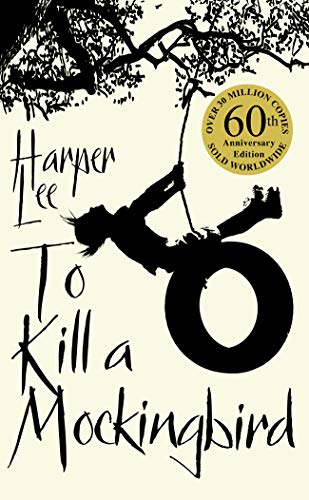
A classic novel that addresses racial injustice and moral growth, “To Kill a Mockingbird” challenges readers to confront their own biases and reflect on the complexities of empathy and compassion.
“To Kill a Mockingbird” is a novel written by Harper Lee, an American author. The book was published in 1960 and has since become a classic of modern American literature. It is set in the fictional town of Maycomb, Alabama, during the 1930s and addresses important themes of racism, injustice, and moral growth.
The story is narrated by Scout Finch, a young girl, and follows her experiences growing up in a racially divided Southern town. The central plot revolves around the trial of Tom Robinson, a black man accused of raping a white woman, Mayella Ewell. Atticus Finch, Scout’s father and a principled lawyer, is appointed to defend Tom Robinson in court.
Throughout the novel, Lee explores the deep-seated racism and prejudice present in the town, as well as the complexities of moral choices and the consequences of standing up against social norms. Atticus’s defense of Tom Robinson serves as a symbol of his commitment to justice and equality, even in the face of overwhelming opposition.
The title of the book comes from Atticus’s advice to Scout and her brother Jem: “It’s a sin to kill a mockingbird.” The mockingbird is a metaphor for innocence and goodness, and the idea behind this statement is that it’s wrong to harm those who do no harm to others, just as it would be wrong to kill a mockingbird.
“To Kill a Mockingbird” deals with serious and impactful themes, but it is also a coming-of-age story that captures the perspective of a young girl as she navigates the complexities of her community. The novel has been praised for its compelling characters, powerful storytelling, and its exploration of moral and social issues.
It is worth noting that Harper Lee only published one other novel, “Go Set a Watchman,” which was actually written before “To Kill a Mockingbird” but was published later. “To Kill a Mockingbird” remains her most famous and enduring work, and it continues to be studied and celebrated for its timeless relevance and its contributions to discussions on race, morality, and the human experience.
4. “The Power of Habit” by Charles Duhigg:
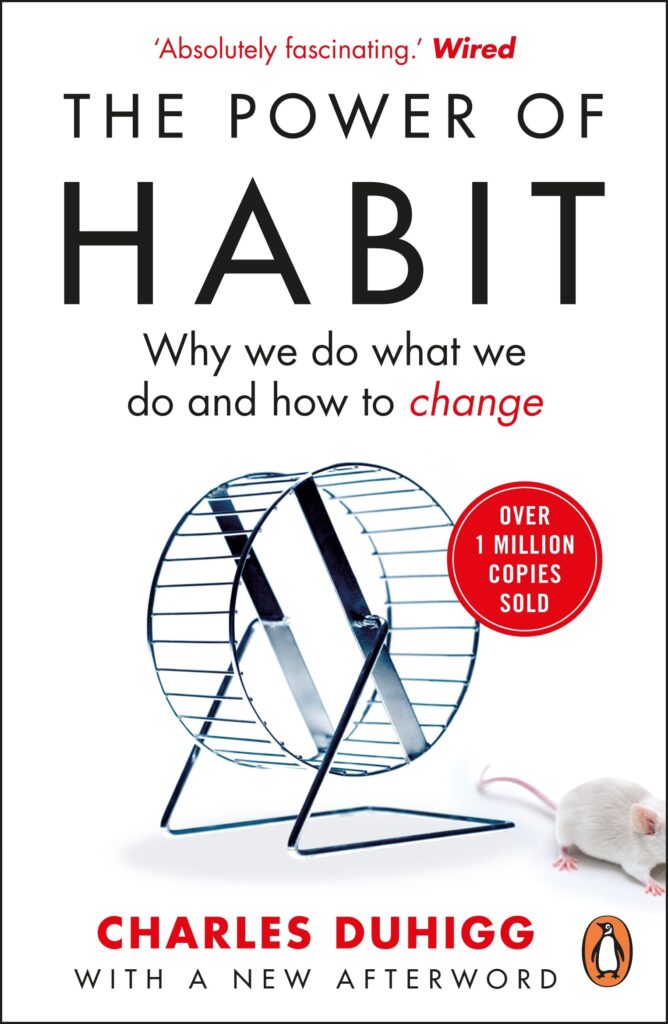
Delving into the science of habits, Duhigg provides a roadmap for understanding how habits work and how they can be transformed, empowering readers to make positive changes in their lives.
“The Power of Habit: Why We Do What We Do in Life and Business” is a book written by Charles Duhigg, an American journalist and author. Published in 2012, the book explores the science behind habits, how they are formed, and how they can be changed.
Duhigg delves into the neurological and psychological processes that underlie habit formation, using real-life examples and case studies to illustrate his points. He introduces the concept of the “habit loop,” which consists of three components: the cue, the routine, and the reward. The cue is the trigger that initiates the habit, the routine is the behavior itself, and the reward is the positive outcome that reinforces the habit.
The book discusses how habits are not just individual behaviors but can also influence organizations, societies, and even the economy. Duhigg explains how understanding the science of habit formation can be useful in various areas, including personal development, business management, and social change.
Duhigg also emphasizes the idea of “keystone habits,” which are certain habits that can lead to positive changes in other areas of one’s life or organization. By identifying and focusing on these keystone habits, individuals and organizations can create a positive ripple effect that leads to broader improvements.
Additionally, the book delves into how habits can be changed or replaced. Duhigg discusses the importance of recognizing the cues and rewards associated with a habit in order to modify or replace the routine. He presents strategies for breaking bad habits and forming new, healthier ones.
“The Power of Habit” has been well-received for its accessible explanations of scientific concepts and its practical advice on how individuals and organizations can harness the power of habits to improve their lives and achieve their goals. The book has been influential in the fields of psychology, self-help, and business, and it has sparked discussions about the role of habits in shaping behavior and decision-making.
5. “Quiet: The Power of Introverts in a World That Can’t Stop Talking” by Susan Cain:
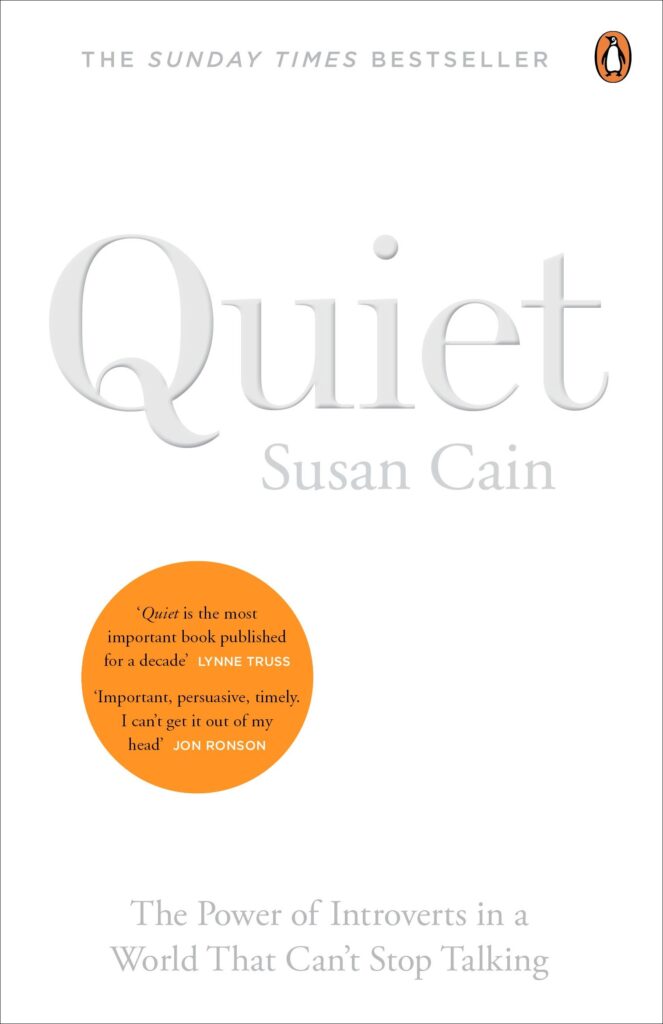
In a world that often celebrates extroversion, Cain celebrates the power of introverts and provides insights into how they can harness their unique strengths to thrive in various aspects of life.
“Quiet: The Power of Introverts in a World That Can’t Stop Talking” is a book written by Susan Cain, an American author, speaker, and former lawyer. Published in 2012, the book explores the qualities and strengths of introverted individuals in a society that often values extroversion.
Cain’s book challenges the notion that extroversion is the ideal personality trait and highlights the valuable contributions that introverts can make in various aspects of life, including work, education, and personal relationships. She discusses the cultural shift toward extroversion in many Western societies and how this can lead to misunderstandings and undervaluing of introverted individuals.
Cain delves into the science of introversion and extroversion, explaining the neurological and physiological differences between the two personality types. She discusses how introverts often thrive in quieter, more contemplative environments, and she challenges the assumption that social skills are solely the domain of extroverts.
Throughout the book, Cain shares anecdotes, research findings, and interviews with introverted individuals from various fields, including business, science, and the arts. She highlights how introverts can bring unique perspectives, creativity, and leadership qualities to the table, often in ways that differ from extroverted counterparts.
Cain also addresses the challenges that introverts may face in a world that often celebrates extroversion. She provides advice on how introverts can navigate social situations, advocate for their needs, and embrace their authentic selves without feeling pressured to conform to extroverted norms.
“Quiet” sparked discussions about the value of introversion and the need for a more inclusive and balanced appreciation of both introverted and extroverted traits. The book has resonated with many readers who identify as introverts and those who seek to better understand and support introverted individuals in their personal and professional lives.
Overall, “Quiet” sheds light on the power of introversion and encourages a broader understanding of personality diversity, ultimately advocating for a world where both introverted and extroverted individuals can thrive and contribute their unique strengths.
6. “Atomic Habits” by James Clear:
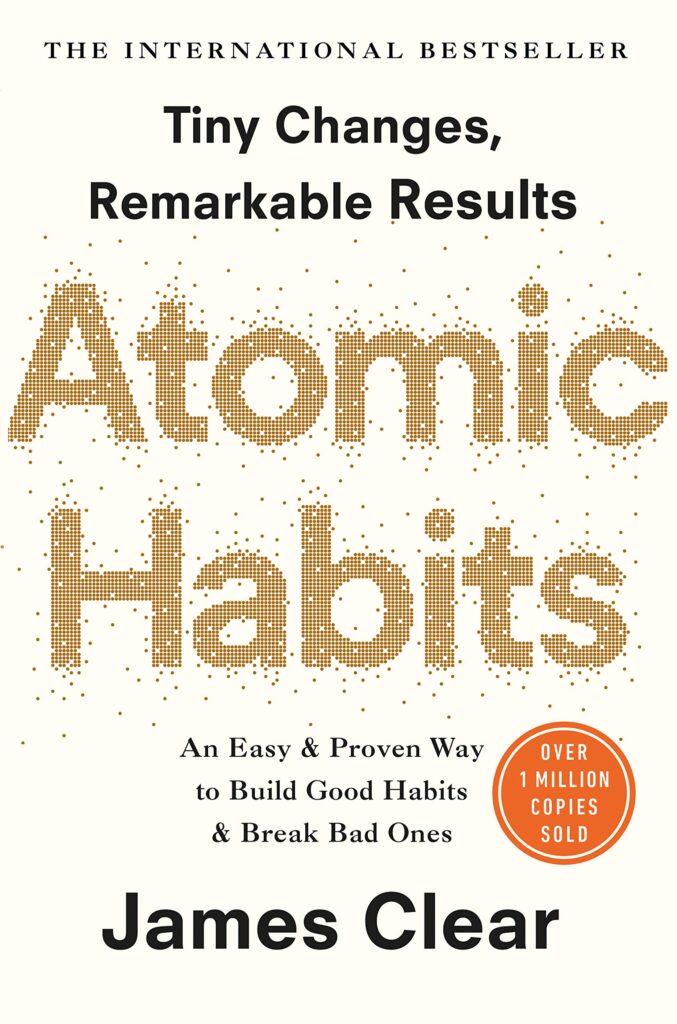
Clear offers actionable advice on how to build good habits, break bad ones, and make lasting changes. His focus on incremental progress and the compounding effect of small actions is both practical and transformative.
“Atomic Habits: An Easy & Proven Way to Build Good Habits & Break Bad Ones” is a book written by James Clear, an American author, speaker, and productivity expert. Published in 2018, the book focuses on the science of habit formation and provides practical strategies for creating and maintaining positive habits while eliminating negative ones.
The central premise of “Atomic Habits” is that small, incremental changes can lead to significant improvements over time. Clear introduces the concept of “atomic habits,” which are tiny, fundamental changes that, when repeated consistently, can lead to transformative results. He emphasizes that the key to effective habit change lies in making small adjustments that are easy to integrate into daily life.
The book is structured around the four stages of habit formation, referred to as the “Four Laws of Behavior Change.” These laws are:
- Cue (Make it Obvious): Make the desired behavior obvious and easily noticeable.
- Craving (Make it Attractive): Create a sense of reward or attraction for the behavior.
- Response (Make it Easy): Simplify the behavior by breaking it down into smaller steps.
- Reward (Make it Satisfying): Associate positive outcomes with the behavior to reinforce its repetition.
Clear also discusses the concept of “habit stacking,” where a new habit is linked to an existing one, making it easier to remember and integrate into daily routines.
The book provides numerous practical examples, case studies, and actionable advice to help readers apply these concepts to their own lives. Clear draws from a range of fields, including psychology, neuroscience, and business, to offer insights into why habits work the way they do and how to leverage that knowledge to achieve personal growth and productivity.
“Atomic Habits” has been widely praised for its clear and engaging writing style, as well as its actionable and evidence-based strategies. The book has resonated with individuals seeking to make positive changes in their lives, whether related to health, productivity, relationships, or personal development. It has become a popular resource in the self-help and personal improvement genres, offering readers practical tools to make lasting and meaningful changes.
7. “Becoming” by Michelle Obama:

In this memoir, the former First Lady shares her journey from her childhood to the White House, touching on themes of identity, resilience, and the importance of authenticity.
“Becoming” is a memoir written by Michelle Obama, the former First Lady of the United States. The book was published in 2018 and offers a personal and reflective account of her life, experiences, and journey from childhood to her time in the White House.
The memoir is divided into three parts:
- Becoming Me: This section delves into Michelle Obama’s early life, growing up in Chicago and her experiences as a young girl from a working-class family. She discusses her education, the influence of her parents, and her determination to excel academically.
- Becoming Us: In this part, Michelle shares her experiences in college and law school, her early career, and her first encounters with Barack Obama. She candidly discusses their courtship, marriage, and the challenges they faced as a couple.
- Becoming More: The final section focuses on her time in the White House as First Lady. Michelle Obama discusses the responsibilities and opportunities that came with the role, as well as her efforts to champion causes such as education, military families, and healthy eating through initiatives like the “Let’s Move!” campaign.
Throughout the book, Michelle Obama reflects on her identity, values, and the lessons she learned from various life experiences. She discusses the importance of family, the struggles she faced as a woman and as an African American, and her commitment to using her platform for positive change.
“Becoming” provides readers with a behind-the-scenes look at her life in the White House, as well as her thoughts on politics, leadership, and the impact of public service. The book is celebrated for its candid and relatable tone, as well as its insights into the personal and public aspects of Michelle Obama’s life.
The memoir was well-received by readers and critics alike, becoming a bestseller and sparking conversations about identity, empowerment, and the complexities of life in the public eye. It offers an intimate and humanizing portrayal of a woman who played a significant role in American history and continues to inspire many with her stories and experiences.
8. “Sapiens: A Brief History of Humankind” by Yuval Noah Harari:
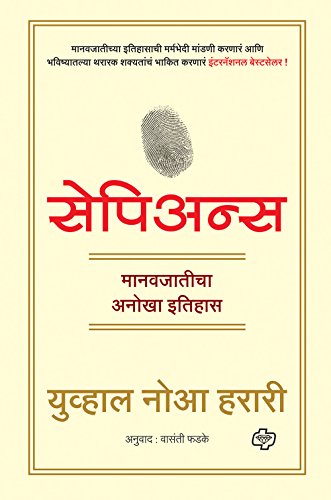
Harari takes readers on a sweeping journey through the history of humanity, challenging conventional narratives and prompting introspection about the trajectory of our species.
“Sapiens: A Brief History of Humankind” is a book written by Yuval Noah Harari, an Israeli historian and author. Published in 2014, the book provides an expansive overview of the history of the human species, from the emergence of Homo sapiens to the present day.
Harari’s book covers a wide range of topics related to human history, including the cognitive, agricultural, and industrial revolutions, as well as the development of cultures, societies, and belief systems. The book examines how humans have shaped their environment, harnessed technology, and established complex social structures.
Key themes and concepts explored in “Sapiens” include:
- Cognitive Revolution: Harari discusses how the development of language and shared myths allowed humans to communicate and cooperate on a large scale, leading to the growth of complex societies.
- Agricultural Revolution: The book examines how the shift from hunting and gathering to agriculture brought about significant changes in human lifestyle, population growth, and social organization.
- The Development of Money and Trade: Harari explores how the invention of money facilitated the exchange of goods and services beyond traditional bartering systems.
- The Formation of Empires and Sociopolitical Structures: The book delves into the rise of empires, kingdoms, and other sociopolitical structures, discussing the forces that drive human cooperation and organization.
- Religion, Science, and Belief Systems: Harari analyzes the role of religion, science, and ideologies in shaping human cultures, beliefs, and worldviews.
- The Impact of Technology and Industrialization: The book discusses the Industrial Revolution and its transformative effects on human societies, economies, and environments.
- Modern Challenges and Future Possibilities: Harari reflects on contemporary issues, including the implications of technology, artificial intelligence, and potential future trajectories for humanity.
“Sapiens” is known for its engaging narrative style, its ability to synthesize complex historical concepts, and its thought-provoking insights into the human condition. The book has garnered widespread acclaim for its ambitious scope and its ability to present a cohesive and accessible overview of human history.
The success of “Sapiens” has led to additional works by Yuval Noah Harari, including “Homo Deus: A Brief History of Tomorrow” and “21 Lessons for the 21st Century,” both of which further explore themes related to the past, present, and future of humanity.
9. “The Subtle Art of Not Giving a F*ck” by Mark Manson:
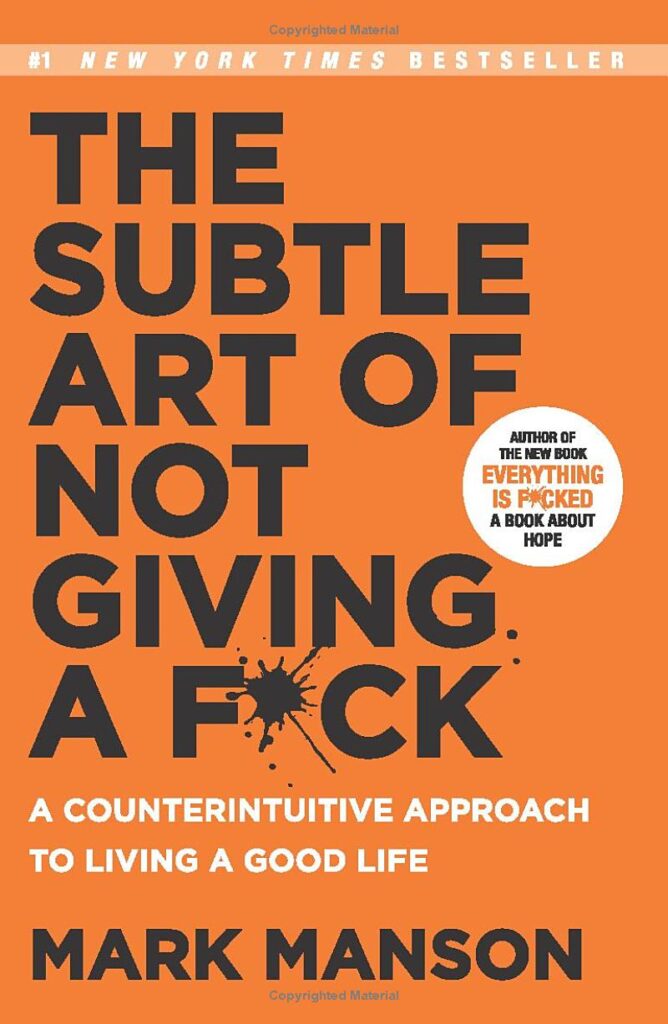
Manson presents a refreshing take on self-improvement by advocating for embracing life’s challenges and limitations, and focusing on what truly matters.
“The Subtle Art of Not Giving a F*ck: A Counterintuitive Approach to Living a Good Life” is a self-help book written by Mark Manson, a blogger and author. Published in 2016, the book offers a unique and sometimes blunt perspective on personal development and finding meaning in life.
The central premise of the book challenges the idea that positive thinking and relentless pursuit of happiness are the keys to a fulfilling life. Instead, Manson suggests that embracing discomfort, accepting limitations, and focusing on values that truly matter are more effective paths to a meaningful and contented life.
Key themes and concepts explored in “The Subtle Art of Not Giving a F*ck” include:
- Value-based Living: Manson emphasizes the importance of choosing what to care about and identifying core values that resonate with an individual’s true priorities.
- Responsibility and Ownership: The book advocates for taking responsibility for one’s life, choices, and emotions rather than blaming external factors.
- Embracing Adversity: Manson argues that adversity and discomfort are inevitable in life and that embracing these challenges can lead to personal growth and resilience.
- The Limitations of Positive Thinking: The book questions the effectiveness of relentlessly pursuing happiness and highlights the value of acknowledging negative emotions and experiences.
- Acceptance of Mortality: Manson encourages readers to confront the reality of their own mortality as a way to gain perspective and make meaningful choices.
- Setting Realistic Expectations: The book discusses the dangers of pursuing unrealistic goals and the benefits of setting attainable expectations.
- Defining Success and Failure: Manson challenges conventional definitions of success and failure, suggesting that a more balanced and realistic perspective can lead to greater contentment.
“The Subtle Art of Not Giving a F*ck” is known for its straightforward and irreverent tone, as well as its ability to offer unconventional insights into personal growth and well-being. The book has resonated with readers who appreciate its candid approach to life’s challenges and its encouragement to confront discomfort and limitations.
While the book’s title and language may be provocative, its underlying message is about choosing what truly matters and aligning actions with values to lead a more fulfilling and purposeful life.
10. “The Seven Habits of Highly Effective People” by Stephen R. Covey:
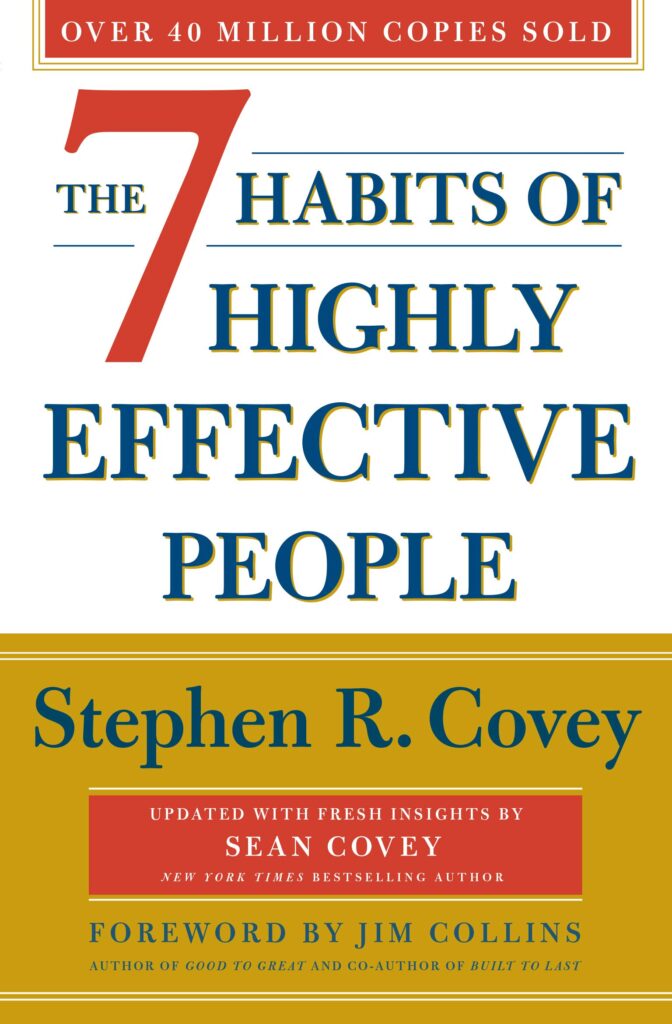
Covey’s principles for personal and interpersonal effectiveness offer a holistic approach to achieving success while maintaining a strong sense of ethics and integrity.
“The 7 Habits of Highly Effective People: Powerful Lessons in Personal Change” is a self-help and personal development book written by Stephen R. Covey. First published in 1989, the book has become a widely acclaimed and influential work in the field of personal growth and leadership.
The book is structured around seven principles or “habits” that Covey presents as essential for achieving personal effectiveness and success. These habits are organized into three main sections:
Private Victory (Habits 1-3):
- Be Proactive: Covey emphasizes the importance of taking initiative and responsibility for one’s actions, attitudes, and choices. Being proactive means focusing on what can be controlled and not being reactive to external circumstances.
- Begin with the End in Mind: This habit encourages individuals to define their personal and professional goals and to create a clear vision of their desired outcomes.
- Put First Things First: Covey suggests prioritizing tasks based on importance rather than urgency. This involves effective time management and aligning actions with long-term goals.
Public Victory (Habits 4-6): 4. Think Win-Win: Covey discusses the value of seeking mutually beneficial solutions in interactions and relationships, rather than adopting a competitive or zero-sum mindset.
- Seek First to Understand, Then to Be Understood: This habit emphasizes the importance of active listening and empathy in communication, fostering better understanding and more effective relationships.
- Synergize: Covey encourages the collaboration and cooperation of individuals to achieve greater results than could be achieved individually. The goal is to create synergy through diverse perspectives and skills.
Renewal (Habit 7): 7. Sharpen the Saw: This habit focuses on self-renewal and self-care. Covey suggests taking care of one’s physical, mental, emotional, and spiritual well-being to maintain a sustainable and effective lifestyle.
Covey’s book emphasizes the importance of personal character and principles as the foundation for long-lasting success and meaningful interactions with others. He encourages readers to adopt a values-driven approach to life and to consistently work on developing positive habits that align with their principles.
“The 7 Habits of Highly Effective People” has resonated with individuals seeking personal and professional growth, leadership development, and improved relationships. It has been praised for its holistic and principle-centered approach to personal effectiveness, as well as its practical advice and actionable insights. The book continues to be a popular and influential resource in the realm of self-improvement.
Conclusion
Each of these books has the potential to catalyze personal growth and ignite new perspectives. Whether you’re seeking inspiration, guidance, or a deeper understanding of the world, these life-changing reads will undoubtedly leave an imprint on your journey of self-discovery. Remember, the power of a book lies not only in the words on its pages but in the impact it has on the reader’s mind and heart. Happy reading and transformative exploration!
ALSO READ ABOUT: Top 10 Must-Read Books for Mastering Digital Marketing

Pingback: Elevate Your Mind: Top 10 Learning Books - D-Learn & Earn